|
|
|
Sort Order |
|
|
|
Items / Page
|
|
|
|
|
|
|
| Srl | Item |
| 1 |
ID:
108003
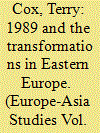

|
|
|
| 2 |
ID:
167250
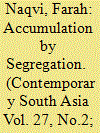

|
|
|
|
|
| Summary/Abstract |
This article is part of a Book Forum review of Ghazala Jamil’s book Accumulation by Segregation (2017). The Book Forum consists of individual commentaries on this text by four interested scholars, followed by a response by the author. The article may be read individually or alongside the other contributions to the Forum, which together constitute a comprehensive discussion of the themes and arguments in the book.
|
|
|
|
|
|
|
|
|
|
|
|
|
|
|
|
| 3 |
ID:
167254
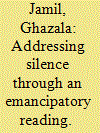

|
|
|
|
|
| Summary/Abstract |
This article is part of a Book Forum review of Ghazala Jamil’s book Accumulation by Segregation (2017). The Book Forum consists of individual commentaries on this text by four interested scholars, followed by a response by the author. The article may be read individually or alongside the other contributions to the Forum, which together constitute a comprehensive discussion of the themes and arguments in the book.
|
|
|
|
|
|
|
|
|
|
|
|
|
|
|
|
| 4 |
ID:
160849
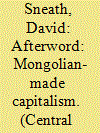

|
|
|
|
|
| Summary/Abstract |
Oligarchy (oligarhi) has become a well-worn Mongolian term for describing the social order. Real power and wealth is now said to be monopolized by a small number of super-elite families. The roots of this oligarchic capitalism lie in the process by which ownership was acquired and concentrated so as to take control of companies, rather than simply making profitable investments. The emergent form resembles Thomas Piketty's notion of ‘patrimonial capitalism’, a political economy dominated by inherited private capital, rather than the wealth created by entrepreneurship or innovation. Mongolian capitalism can also be seen as patrimonial in another sense. Its roots lie in the opportunistic struggle over a form of national patrimony: the enterprises and resources inherited from the previous political economy. The new proprietorial class already appears faintly dynastic, and presently there seem to be no barriers to the transmission of wealth to the next generation of super-rich.
|
|
|
|
|
|
|
|
|
|
|
|
|
|
|
|
| 5 |
ID:
064524
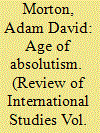

|
|
|
| 6 |
ID:
184209
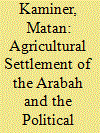

|
|
|
|
|
| Summary/Abstract |
Agricultural settlement geared to capitalist commodity production and accompanied by massive ecological interventions has historically been central to the Zionist colonial project of creating a permanent Jewish presence in the “Land of Israel.” The hyperarid southern region known as the Central Arabah is an instructive edge-case: in the 1960s, after the expulsion of the bedouin population, cooperative settlements were established here and vegetables produced through “Hebrew self-labor,” with generous assistance from the state. In the 1990s the region was again transformed as the importation of migrant workers from Thailand enabled farmers to expand cultivation of bell peppers for global markets. But today ecological destruction, depletion of water resources, and global warming cast doubt over the viability of settlement in this climatically extreme region. I locate the settlements of the Arabah within the historical political ecology of the Zionist movement, arguing that their current fragility exposes the essential precarity of capitalist colonization.
|
|
|
|
|
|
|
|
|
|
|
|
|
|
|
|
| 7 |
ID:
047792
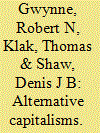

|
|
|
|
|
| Publication |
London, Arnold, 2003.
|
| Description |
viii, 248p.
|
| Standard Number |
0340763213
|
|
|
|
|
|
|
|
|
|
|
|
Copies: C:1/I:0,R:0,Q:0
Circulation
| Accession# | Call# | Current Location | Status | Policy | Location |
| 047146 | 330.122/GWY 047146 | Main | On Shelf | General | |
|
|
|
|
| 8 |
ID:
071015
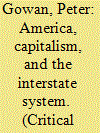

|
|
|
|
|
| Publication |
2005.
|
| Summary/Abstract |
Peter Gowan responds to published criticisms of his article "Triumphing toward International Disaster: The Impasse in American Grand Strategy" (Critical Asian Studies 36, no. 1 [March 2004]: 3-36) by Kristen Nordhaug, Ravi Arvind Palat, Vijay Prashad, Marika Vicziany, Mark T. Berger, and Heloise Weber (see Critical Asian Studies 37, no. 1 [March 2005]: 75-140).
|
|
|
|
|
|
|
|
|
|
|
|
|
|
|
|
| 9 |
ID:
069355
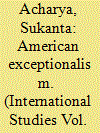

|
|
|
| 10 |
ID:
113608
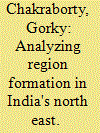

|
|
|
| 11 |
ID:
050707
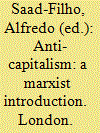

|
|
|
|
|
| Publication |
London, Pluto Press, 2004.
|
| Description |
vii, 269p.
|
| Standard Number |
0745318932
|
|
|
|
|
|
|
|
|
|
|
|
Copies: C:1/I:0,R:0,Q:0
Circulation
| Accession# | Call# | Current Location | Status | Policy | Location |
| 047703 | 335.412/SAD 047703 | Main | On Shelf | General | |
|
|
|
|
| 12 |
ID:
064203
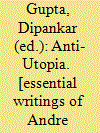

|
|
|
|
|
| Publication |
New Delhi, Oxford University Press, 2005.
|
| Description |
viii, 494p
|
| Standard Number |
0195672291
|
|
|
|
|
|
|
|
|
|
|
|
Copies: C:1/I:0,R:0,Q:0
Circulation
| Accession# | Call# | Current Location | Status | Policy | Location |
| 049799 | 330.15/GUP 049799 | Main | On Shelf | General | |
|
|
|
|
| 13 |
ID:
120581
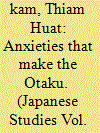

|
|
|
|
|
| Publication |
2013.
|
| Summary/Abstract |
The term 'otaku' is generally used in Japan to denote subcultures revolving around the consumption of popular culture, such as manga, anime and games. This paper, however, seeks to analyze 'otaku' as a label applied to individuals whose consumption is perceived and judged to have compromised certain values in contemporary Japan. Through analysis of interviews with a group of Japanese students, I found that the values they invoke to judge who the 'otaku' are, and which they construe as a form of common sense concerning consumption, correspond to the demands of advanced capitalism: consumption should be productive of capital, either leading to further production or fostering communication that is directly productive. At the same time, people are labeled as 'otaku' not merely for failing to produce capital through their consumption, but also for actively practicing a perversion of the capacities that are necessary to advanced capitalist Japan, most notably imagination and autonomy. 'Otaku' labeling thus points to capital's anxieties over capacities such as imagination, knowledge and autonomy: these capacities, while essential to a flexible and immaterial economy, could potentially become unproductive and threaten advanced capitalism.
|
|
|
|
|
|
|
|
|
|
|
|
|
|
|
|
| 14 |
ID:
106787
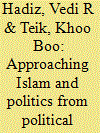

|
|
|
|
|
| Publication |
2011.
|
| Summary/Abstract |
The article traces the trajectories of Islamic politics in Indonesia and Malaysia in relation to the changing political economy of these two countries. The approach adopted is to understand Islamic politics less on the basis of Islamic doctrine, or conflicts over its interpretation, than in connection with the changing social bases of politics, the context established by capitalist economic transformations, the evolution of the post-colonial state from the Cold War and its aftermath, and of crises of political economy in the 1980s and 1990s. The exercise reveals important convergences and divergences in trajectories that help to explain the complex historical processes which have shaped Islamic politics in these two cases and possibly beyond. It also reveals the entanglement of Islamic politics in very profane conflicts over power and tangible economic resources over time. In both countries a new form of Islamic populism has emerged as a major articulator of grievances against the secular state and perceived social injustices. However, the same historical processes have enabled the social agents of Islamic politics in Malaysia to contest state power more effectively than their counterparts in Indonesia.
|
|
|
|
|
|
|
|
|
|
|
|
|
|
|
|
| 15 |
ID:
107214
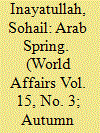

|
|
|
| 16 |
ID:
120196
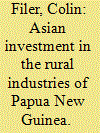

|
|
|
|
|
| Publication |
2013.
|
| Summary/Abstract |
One part of the Australian colonial legacy in PNG is the Australian government's attempt to forge partnerships with different groups of foreign companies in different economic sectors in order to lay the economic foundations for rural development in the newly independent nation. American and Australian capital was invited to develop the mining industry, European capital to develop the oil palm industry, and Japanese capital to develop the forest industry. Nowadays, the Australian government seems to have forgotten its late colonial enthusiasm for this form of state capitalism, and its aid to PNG is largely framed by the neo-liberal policy prescriptions which the World Bank was able to impose on the PNG government through a sequence of structural adjustment programs beginning in 1990. However, members of PNG's national political elite have persistently sought refuge from this economic orthodoxy through their engagement with Asian governments and companies. In this paper I examine the way in which changing political and economic conditions have affected the actual pattern of Asian investment in PNG's forestry and agriculture sectors, and the way in which different stakeholders have responded to this changing pattern of investment. Despite the prevalence of a policy narrative which holds Asian investors responsible for the corruption of PNG's political institutions when mineral resource booms liberate national politicians from the constraints of Western economic orthodoxy, I show that Asian investment in these two sectors has taken several different forms, and there is no simple sense in which PNG's national economy and political system are subject to a concerted takeover by Asian business interests.
|
|
|
|
|
|
|
|
|
|
|
|
|
|
|
|
| 17 |
ID:
181895
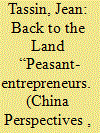

|
|
|
|
|
| Summary/Abstract |
This paper analyses the framing processes at play in the re-definition of “peasant agroecology” in contemporary China. Based on the study of “new-farmers” who have emerged in the networks of organic peasant agriculture, it interrogates the ambiguities of food ethics as the cornerstone of alternative food markets. The research explores the emergence of “peasant-entrepreneurs” (1) through the transmission of values and skills in processes of cultural heritage enhancement, (2) through the establishment of “trust” in the market relationship, and (3) through the negotiation between producers and retailers in a quality market for singular goods.
|
|
|
|
|
|
|
|
|
|
|
|
|
|
|
|
| 18 |
ID:
125157
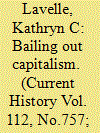

|
|
|
|
|
| Publication |
2013.
|
| Summary/Abstract |
[F]or the democratic political and capitalist economic systems to survive, a government's response to a crisis must rise above the interests of one class alone. Widespread social unrest signals the need to reformulate the regulatory order."
|
|
|
|
|
|
|
|
|
|
|
|
|
|
|
|
| 19 |
ID:
029694
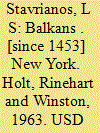

|
|
|
|
|
| Publication |
New York, Holot, Rinehart and Winston, 1963.
|
| Description |
xxi, 970p.Hbk
|
| Series |
Rinehart Books in European History
|
|
|
|
|
|
|
|
|
|
|
|
Copies: C:1/I:0,R:0,Q:0
Circulation
| Accession# | Call# | Current Location | Status | Policy | Location |
| 000523 | 949.6/STA 000523 | Main | On Shelf | General | |
|
|
|
|
| 20 |
ID:
100150
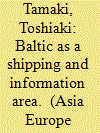

|
|
|
|
|
| Publication |
2010.
|
| Summary/Abstract |
In early modern times, the Netherlands imported grain from the Baltic, especially Poland, and re-exported it elsewhere in Europe. The Dutch shipping industry was extremely profitable, for transport costs were very high, and the number of Dutch ships was by far the largest among the European countries. Dutch prosperity was based on shipping of grain from the Baltic. Amsterdam was also a center of information because it was a port at which many ships stayed, and which attracted various merchants owing to its policy of religious tolerance. Much commercial information and know-how were accumulated in and spread from Amsterdam which contributed to the growth of the regional European economy from the Baltic because many merchants migrated to Northern Europe via the city, bringing with them the latest commercial techniques. Amsterdam therefore served as a core of Baltic integration in the early modern period, for it was a center of shipping and information.
|
|
|
|
|
|
|
|
|
|
|
|
|
|
|
|
|
|
|
|
|